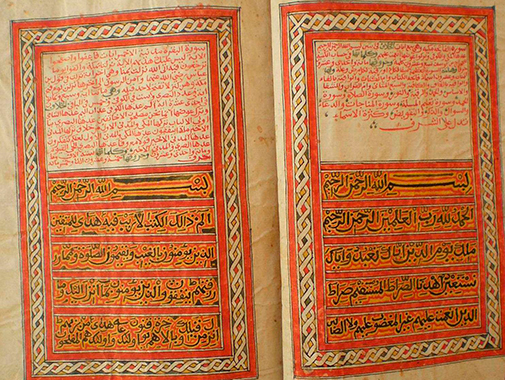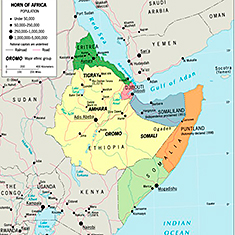Forgotten Islamic literary tradition uncovered in the Horn of Africa
Researchers from the University of Copenhagen have spent the last five years identifying and analysing more than 2,000 Islamic manuscripts in the Horn of Africa in order to map and preserve the rich, but largely forgotten, Islamic literary tradition of the area. The researchers have also digitized the manuscripts and created an online database that will provide scholars across the globe with a valuable tool for future research into the history and traditions of Islam.

Traditionally, scholars from Islamic studies have not associated the Horn of Africa with the Muslim world, which is why the Islamic literary tradition of this part of Africa has not been studied in detail before. But a team of researchers from the ERC funded Islam in the Horn of Africa project at the University of Copenhagen have now identified and analysed more than 2,000 Islamic manuscripts in Ethiopia, Eritrea, Djibouti, and Somalia. The researchers have digitized the manuscripts and created a database, which will enable other researchers to study the fragile manuscripts and contribute to the research into this hitherto neglected literary tradition of Islam:
“Scholars from the fields of Islam studies and African studies have long neglected the Horn of Africa because they tend to find the area atypical of either field and primarily associate it with the Christian traditions of the Horn’s largest country Ethiopia. But as our research project has shown, there has been a rich and distinct Islamic literary tradition in the Horn of Africa that dates back at least to the 17th and 18th centuries,” explained Associate Professor Alessandro Gori, who is the principal investigator of the Islam in the Horn of Africa project at the University of Copenhagen. He added:
“The manuscripts indicate that Muslims in certain parts of the Horn area seem to have had a penchant for composing devotional or mystical texts that people have gathered to recite or ‘sing’ accompanied e.g. by clapping hands and drums – although they would not have used the word ‘sing’ as it can become problematic in an Islamic context. This is something that is characteristic of and particular to the Horn’s Islamic tradition, but it is still recognizably Islamic of course; you may compare it to the Lutheranism of Denmark that is different from, say, the Lutheranism of Northern Germany. But it is still Lutheranism.”
Qurans, Islamic law and Arabic grammar
Apart from the many texts on mysticism, the researchers have uncovered a large number of Qurans, texts on Islamic law and Arabic grammars. Most of the texts are written in Arabic, but there are also some in local languages like Harari, Amharic and Somali written in the Arabic alphabet.

“Arabic is of course central to the study of Islam, and many of the local people who lived in the Horn of Africa would not have known Arabic, which is why there are relatively many texts on Arabic grammar in the collections of manuscripts we have retrieved. Arabic basically served the same function as Latin did in Christian Europe – if you were a learned person and a Muslim, you had to have a more than basic knowledge of Arabic,” Alessandro Gori pointed out.
Cultural heritage saved for future generations
Many texts, particularly those retrieved from rural areas with poor storage conditions, were badly damaged and fragmented, and some would have been completely lost had the researchers not found them.
“We have produced a short handbook on how to deal with fragile manuscripts so as to avoid further deterioration of the delicate texts, but we have also, more importantly, digitized them and created a database that will make it possible to study the content of the manuscripts without touching them. The database e.g. contains information about genres, authors, marginal notes and the texts’ ownership history. We now hope that colleagues from around the world will use and contribute to the improvement of database so that it will keep growing and making us more knowledgeable of local African versions of Islam.”
Contact
Associate Professor Alessandro Gori
Islam in the Horn of Africa: A Comparative Literary Approach
Department of Cross-Cultural and Regional Studies
University of Copenhagen
Mail: frd322@hum.ku.dk
Mobil: + 45 21 17 97 71
Topics
Contact
Associate Professor Alessandro Gori
Islam in the Horn of Africa: A Comparative Literary Approach
Department of Cross-Cultural and Regional Studies
University of Copenhagen
Mail: frd322@hum.ku.dk
Phone: + 45 21 17 97 71
Press officer Carsten Munk Hansen
Faculty of Humanities
Mail: carstenhansen@hum.ku.dk
Phone: + 45 28 75 80 23
ERC funding

This project has received funding from the European Research Council (ERC) under the European Union's Seventh Framework Programme (Advanced Grant no. 322849).

